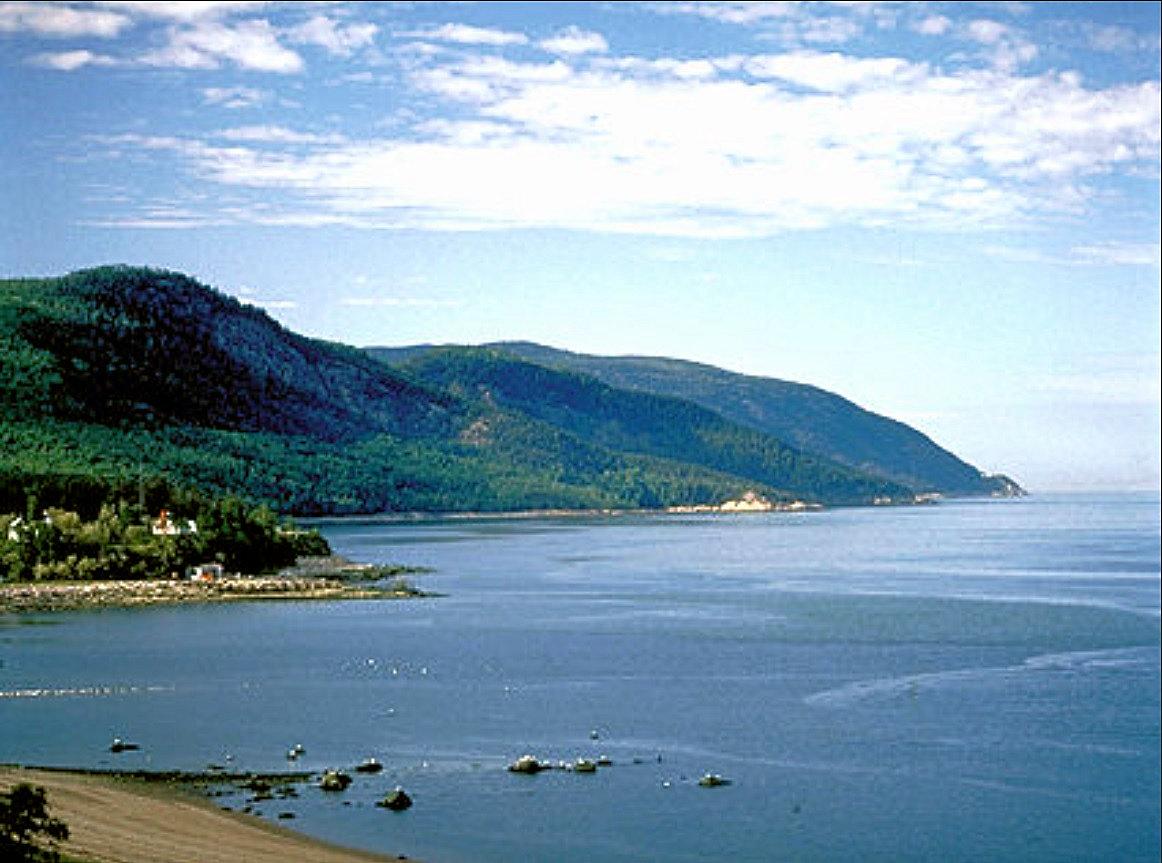Home › Forums › Other (non-Buddhist) teachings by Tarthang Tulku › Rivers I have known
Tagged: caring, life systems, mountains, rivers, sky
- This topic has 0 replies, 1 voice, and was last updated 10/29/2023 at 4:27 PM by Michael Gray.
-
AuthorPosts
-
-
October 29, 2023 at 4:27 pm #1203

St Lawrence River, north shore at St-Siméon. photo by Bill Brooks
“We care about the lakes and the mountains and the sky, for we know that they are our progenitors.” Caring, by Tarthang Tulku, page 150.
This unfamiliar perception caught me by surprise, when I recognized a seldom-honored truth in my life. I’ve been aware that times and places from my earlier life regularly replay in my mind–as if they are permanent residents there–but it is a fresh idea that some of these images have no choice but to stick around, because they are my ancestors.
Perhaps I am being offered an invitation to become more intimate with the influences that have formed my values and affinities and that continue to guide my desire to feel part of a greater whole that embraces me, together with everything around me.
I remember how in my youth, growing up in a west-end suburb of Montreal, we could just walk a few blocks and reach the three-mile-widening of the Saint Lawrence River as it flows around Montreal Island on its way from the Great Lakes to the Atlantic Ocean. Those sparkling waters have given me a lasting image of what is nurturing in this world.
At the same time, I have also experienced that those transparent waters–through which for my entire years of growing up I could swim with my eyes wide open above a pristine sandy bottom in which no clots of algae or floating dead fish were ever to be seen–were themselves fragile. That healing clarity was replaced in just a few years with dead eels and warnings about the risk of getting polio if you continued to swim there.
Those memories have left me feeling profoundly fortunate to have known a part of our world in which natural beauty shone forth in my daily experience.
I also experienced in those years what it felt like to cross-country ski beneath snow-laden pine branches north of Montreal, where my uncle and aunt lived in the middle of a spacious pasture with cattle grazing morning and evening, almost as free as I was to partake in this world.
Have you ever noticed that when our explorations, explanations and visions corroborate one another, their several voices—as we search for some kind of welcoming reality in which we can feel grounded–gain strength from one another? This sense of corroboration and collaboration is all the more impressive if those contributing voices seem to come from different parts of the mysterious landscape in which our being keeps arising.
Those gestures of connection coming together—like driftwood washed up on a beach—may have come from different forests growing on different shores. At this point in my life, these voices include my recent reading about how human life is one part of a medley of life systems composing our planet; each part no more independent of that symphony of life than our lungs and heart are from the air we breathe. Another element is the vision of the book, Caring, from which I have so profoundly benefited in the past several years.
The importance of engaging our life by caring for ourselves, for others and for the cosmic wholeness in which we keep arising, is a reflection of our human presence on this living planet and in the universe. The note sounding out the proclamation that the mountains, rivers and sky are our mother is surely a clarion call for care.
This way of looking at our relationship with Mother Earth could not evoke more strongly the vision that I have been exploring in the past several months: that the extractive ransacking of the resources of our living planet is not only damaging our planet; it is a form of self-immolation, since we and our planet are all one integral organism.
When we let ourselves recognize the truth of the sentence quoted above–that the sky, the free-flowing streams and the mountains are themselves our mother—who doesn’t feel a pang of grief that humanity is so deeply mired in our uncaring interactions with her.
What was most unexpected in this vision of intimate and all-inclusive wholeness is the recognition that my memories of growing up at the edge of a 3-mile-wide bulge in the Saint Lawrence River, whose pristine and sparkling waters welcomed me with open arms, has seeded in me an understanding–which I so easily forget–that I really am a child of this beautiful planet; that my dreams are her dreams; and that I must honor them as best I can.
There are losses too. I remember my mother driving me through a soft rain, while the back-and-forth swipes of the wipers mirrored my inner sadness after my first girlfriend had decided not to see me anymore. I was headed off for a summer in Happy Valley, Labrador, not by choice but because Montreal felt empty for me. I knew that my mother felt my sense of loss, just as I can understand the grief of others around me now.
I have begun to discover in the years since then that these losses can let us know that there was something precious in our lives, which now keeps living on in us.
-
-
AuthorPosts
- You must be logged in to reply to this topic.
